Hi there! If you missed the earlier snippets of my story, no worries! You can catch up here:
I had to be.
It was the only way my symptoms made any sort of sense.
Some doctors said it in a kinder way than others, but each doctor eventually reached the same soul-crushing conclusion.
I became an expert at reading the facial expressions of each new doctor. Initially, each new appointment would start out well with a professional sit-down-and-tell-me-what's-ailing-you face. Then I would get the we'll-do-a-round-of-tests-and-get-to-the-bottom-of-this look. Perhaps at some point I'd even be granted a wow-you-must-be-really-strong-to-deal-with-this look. But without fail, by the end of our time together, each doctor's face would eventually reflect the only-a-psychiatrist-can-help-this-girl expression.
I became an expert at reading the facial expressions of each new doctor. Initially, each new appointment would start out well with a professional sit-down-and-tell-me-what's-ailing-you face. Then I would get the we'll-do-a-round-of-tests-and-get-to-the-bottom-of-this look. Perhaps at some point I'd even be granted a wow-you-must-be-really-strong-to-deal-with-this look. But without fail, by the end of our time together, each doctor's face would eventually reflect the only-a-psychiatrist-can-help-this-girl expression.
My case wasn't helped by the fact that my symptoms noticeably worsened after a spring break's worth of family drama (I've since learned that these flare-ups are totally normal in POTS patients under stress, but at the time we had no idea what was going on). So we eventually succumbed to the pressure from my doctors, and my parents paid for me to start seeing a Christian counselor. We honestly had no idea if counseling was the answer to my problems, but by that point we were running out of other viable solutions.
My counselor did her job well. She listened to my long story about doctors and health issues and fear of never finding answers. Then at some point, our conversation transitioned to discussing emotional trauma from my childhood. The pain I held from years past was still as raw and real to me as the day it happened, and I wasn't able to speak of the past without bursting into tears. That day I was able to tell my counselor things which I had never dared breathe to another soul. Thankfully, my parents (to whom mental illness was a slightly foreign concept) recognized just how much I needed counseling and paid for my sessions to continue.
After a few meetings, my counselor voiced her suspicion that I was suffering from Conversion Disorder (also known as Functional Neurological Disorder). Yet she also encouraged my parents and me to pursue further medical testing. I appreciated her caution. Unlike my doctors, my counselor didn't want to just assume that the cause of my symptoms was solely psychological.
However, while we continued to search for medical answers, my counselor was more than happy to help me sift through the mountains of emotional baggage which I was hiding from the world. My meetings with this counselor were intense. Although she was unable to heal my body, she helped heal my wounded soul more than I ever thought possible. And she didn't just encourage me to talk about wounds of my past; my current struggles were relevant too. My counselor became one of my biggest cheerleaders as I learned to face life with a chronic illness.
And by then I definitely needed every cheerleader I could get, because my life had transformed into something I no longer recognized. The social butterfly with friends at her side and dreams in her eyes had disappeared. Instead, I spent most of my time curled up in my bed desperately trying to recover from the fatigue of spending two or three hours sitting in class. I no longer dreamt of the future. Just surviving one or two days at a time was a battle which seemed impossible to win.
It took every ounce of my strength and willpower to keep fighting that battle. I remember especially hating anything relating to the medical world. I didn't want take any more pills. I didn't want to go to any more appointments, didn't want to see any more doctors, didn't want to keep searching for a diagnosis. I just wanted to bury my head under my blankets and never ever come out again.
While I was busy hiding from the world, my dad kept making appointments for me to see more doctors and have more tests done. Since we hadn't been able to find answers in my hometown, my dad started researching other doctors in other cities who could possibly help me. He made appointments with more doctors than I honestly care to remember. I was annoyed by his persistence, but at the same time it comforted me to know that he was fighting for me even after I had given up.
One batch of appointments my dad made for me was at Mayo Clinic in Minnesota. So after months of waiting for appointment day to arrive, my dad and I took a seven-hour road trip to Mayo Clinic. (He drove while I alternated between sleeping and staring out the window; I was no longer allowed to drive because of my seizures.)
By this time I had grown used to the disappointment of not receiving answers from any of my doctors. But all the way to Mayo Clinic my mind kept churning over this thought that maybe... just maybe, the doctors here at this prestigious hospital might be smart enough to find what is wrong inside my body.
One of my scheduled medical tests at Mayo Clinic was a sleep-deprived EEG. To take this test, I first had to achieve a state of sleep deprivation. So after a long night of bingeing Netflix from the couch in our Airbnb, I dragged my exhausted self into the car shortly after the sun came up the next morning. I remember feeling completely icky and nauseous and shaky all over from lack of sleep. Once we arrived, my dad helped me navigate the many beautiful halls and wings of Mayo Clinic. I finally found the correct waiting area, checked in, and sat down to wait. (And I was so tired by then that I definitely snoozed a bit while I waited.)
I was eventually taken to an EEG testing room, where I sat while the nurse scrubbed little spots on my head until my toes curled. Then the nurse glued the EEG electrodes to my scalp, helped me into bed, and turned out the lights. Alone at last, I curled up under the thin hospital blanket and went to sleep.
When my test was over, I remember the last thing I wanted to do in the entire world was wake up. The lights were too bright. Why can't doctors ever just let you rest for a bit?
Anyway, I kept my eyes open long enough to hear that the results of my test were completely normal. And unless I wanted to admit myself for a more extensive, week-long monitoring, this doctor was done helping me.
The sleep-deprived, zombie version of me then struggled through a few more appointments, but every single test result showed the same thing: my body was 100% disgustingly healthy. Nothing wrong with me. That is, except my mind. My doctors all agreed that my mind needed help.
Because they had no other answer for me, my doctors referred me to Mayo Clinic's center for behavioral health. Amazingly, my dad was able to make a next-day appointment for me with one of Mayo Clinic's doctors who specialized in psychiatric spells. I didn't want to go, but Dad said I should at least go to the appointment and hear the psychiatrist's advice. We didn't think anything would come of it, but we just had to wait and see.
Then my dad drove me back to our Airbnb, where I locked myself in the bedroom and cried my eyes out. I was too upset to sleep. Although my body was still sleep-deprived, I wasn't tired. I was angry. Angry at the doctors, angry at my body, angry at myself, angry at God. My mind raged with the frustration of yet another dead end. Why had I ever let myself get my hopes up? What made me think these doctors would be any different from all my other doctors? Why couldn't I find any answers? Why, why, why? I cried and prayed and raged for what seemed like hours in that tiny little Airbnb bedroom.
Eventually I fell asleep. And the next day, I kept my appointment. I was given a full mental health evaluation at the clinic. My psychiatrist, who was extremely kind, diagnosed me with four things: Major Depressive Disorder, Persistent Depressive Disorder, Generalized Anxiety Disorder, and Panic Disorder.
And based on my evaluation and on the fact that we had no other medical explanation for my seizures, my psychiatrist also diagnosed me with a fifth item: Functional Neurological Disorder (FND; also known as Conversion Disorder) with Psychogenic Non-Epileptic Seizures. Basically, my psychiatrist told me that the trauma I had experienced as a young girl was now manifesting itself as physical symptoms within my body. And the only way to cure those symptoms was through counseling by a licensed therapist.
[Please note: FND is actually a real illness with real physical symptoms, and I am not trying to belittle anyone's struggle with FND. I was given very, very little education by my doctors about this illness, but have done enough research to know that this illness is not at all just "in a patient's head". My more recent POTS diagnosis, however, rules out my previous diagnosis of FND.]
___________________________
I do not deny that I struggle with my mental health. The first four diagnoses from my psychiatrist were absolutely correct, and I am now on medication and in therapy which helps me manage those conditions.
But I have since learned that many of my physical symptoms (confusion, weakness, fatigue, dizziness, near-syncope, non-epileptic seizures, etc.) are not just because of mental trauma. The symptoms that I experience every day do have a true physiological explanation. I don't need a psychiatrist for my seizures; I need a cardiologist. When I feel lightheaded and confused, I don't need to practice grounding techniques; I need to lie down because gravity is literally starving my brain of blood. And when I am perfectly happy but my heart keeps racing, I don't need another anxiety medication; I need medication to raise my blood pressure.
But back then, I didn't know that I had POTS syndrome. Functional Neurological Disorder (FND) seemed to be the only explanation I would ever get. I was too tired to keep pushing for a different answer that I might never find. I was done fighting. So as much as I hated my diagnosis, I buried all my doubts and determined that I would make the most of this brand-new diagnosis.
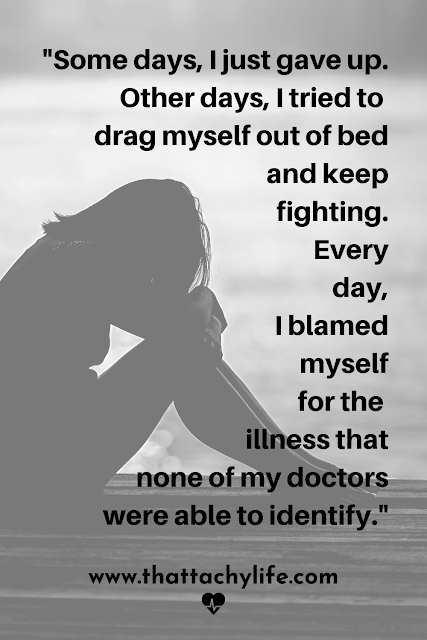
I took all of my psychiatric medications, even the ones that made me feel worse instead of better. And every night I stayed up late researching the heck out of FND, trying to learn new ways to fix my illness. I went to all of my counseling appointments. I practiced coping methods as I trudged through the trauma of my past over and over. And I stared my demons in the face and told them to go back to the hell where they came from.
My depression and anxiety improved, but my other symptoms did not. So I came to the conclusion that I must not be trying hard enough. I was obsessed with the idea that I was the only one who could fix myself. If only I can find the right switch, the right trigger in my mind, then I will be healed. I began to blame myself for still being sick. This led to more depression, more anxiety, more confusion. Some days, I just gave up. Other days, I tried to drag myself out of bed and keep fighting. Every day, I blamed myself for the illness that none of my doctors were able to identify.
___________________________
Come back next week to hear about the day I got my CORRECT diagnosis! (At least, I'm hoping it'll be next week. I've been dealing with a bit of a flare so my writing energy has been kinda compromised lately.)
Update! Read my final post in this series here:
Finally, An Answer: My POTS Diagnosis Story, Part Seven
As you face this coming week, stay healthy and strong. And stay at home. I'm praying for you!
Bonjé Gioja
P.S. Have you ever reached the point where you were so tired of fighting that you just gave up? Do you recommend taking medications for mental illness, or do you prefer to tackle things with natural remedies? Let me know in the comments below if you have any tips for staying sane during this quarantine! :D
P.P.S. Wanna make my day? Don't forget to subscribe! ;)
My counselor did her job well. She listened to my long story about doctors and health issues and fear of never finding answers. Then at some point, our conversation transitioned to discussing emotional trauma from my childhood. The pain I held from years past was still as raw and real to me as the day it happened, and I wasn't able to speak of the past without bursting into tears. That day I was able to tell my counselor things which I had never dared breathe to another soul. Thankfully, my parents (to whom mental illness was a slightly foreign concept) recognized just how much I needed counseling and paid for my sessions to continue.
After a few meetings, my counselor voiced her suspicion that I was suffering from Conversion Disorder (also known as Functional Neurological Disorder). Yet she also encouraged my parents and me to pursue further medical testing. I appreciated her caution. Unlike my doctors, my counselor didn't want to just assume that the cause of my symptoms was solely psychological.
However, while we continued to search for medical answers, my counselor was more than happy to help me sift through the mountains of emotional baggage which I was hiding from the world. My meetings with this counselor were intense. Although she was unable to heal my body, she helped heal my wounded soul more than I ever thought possible. And she didn't just encourage me to talk about wounds of my past; my current struggles were relevant too. My counselor became one of my biggest cheerleaders as I learned to face life with a chronic illness.
And by then I definitely needed every cheerleader I could get, because my life had transformed into something I no longer recognized. The social butterfly with friends at her side and dreams in her eyes had disappeared. Instead, I spent most of my time curled up in my bed desperately trying to recover from the fatigue of spending two or three hours sitting in class. I no longer dreamt of the future. Just surviving one or two days at a time was a battle which seemed impossible to win.
It took every ounce of my strength and willpower to keep fighting that battle. I remember especially hating anything relating to the medical world. I didn't want take any more pills. I didn't want to go to any more appointments, didn't want to see any more doctors, didn't want to keep searching for a diagnosis. I just wanted to bury my head under my blankets and never ever come out again.
While I was busy hiding from the world, my dad kept making appointments for me to see more doctors and have more tests done. Since we hadn't been able to find answers in my hometown, my dad started researching other doctors in other cities who could possibly help me. He made appointments with more doctors than I honestly care to remember. I was annoyed by his persistence, but at the same time it comforted me to know that he was fighting for me even after I had given up.
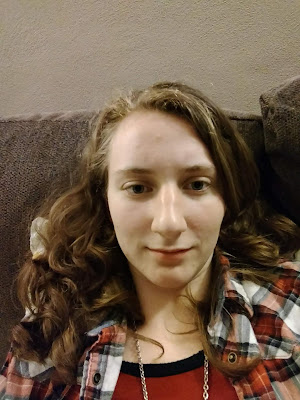 |
| This was the night before my Mayo Clinic appointments. I laid on the couch, attempted a smile, and wondered... Will tomorrow finally be the day I find my diagnosis? |
By this time I had grown used to the disappointment of not receiving answers from any of my doctors. But all the way to Mayo Clinic my mind kept churning over this thought that maybe... just maybe, the doctors here at this prestigious hospital might be smart enough to find what is wrong inside my body.
One of my scheduled medical tests at Mayo Clinic was a sleep-deprived EEG. To take this test, I first had to achieve a state of sleep deprivation. So after a long night of bingeing Netflix from the couch in our Airbnb, I dragged my exhausted self into the car shortly after the sun came up the next morning. I remember feeling completely icky and nauseous and shaky all over from lack of sleep. Once we arrived, my dad helped me navigate the many beautiful halls and wings of Mayo Clinic. I finally found the correct waiting area, checked in, and sat down to wait. (And I was so tired by then that I definitely snoozed a bit while I waited.)
I was eventually taken to an EEG testing room, where I sat while the nurse scrubbed little spots on my head until my toes curled. Then the nurse glued the EEG electrodes to my scalp, helped me into bed, and turned out the lights. Alone at last, I curled up under the thin hospital blanket and went to sleep.
When my test was over, I remember the last thing I wanted to do in the entire world was wake up. The lights were too bright. Why can't doctors ever just let you rest for a bit?
Anyway, I kept my eyes open long enough to hear that the results of my test were completely normal. And unless I wanted to admit myself for a more extensive, week-long monitoring, this doctor was done helping me.
The sleep-deprived, zombie version of me then struggled through a few more appointments, but every single test result showed the same thing: my body was 100% disgustingly healthy. Nothing wrong with me. That is, except my mind. My doctors all agreed that my mind needed help.
Because they had no other answer for me, my doctors referred me to Mayo Clinic's center for behavioral health. Amazingly, my dad was able to make a next-day appointment for me with one of Mayo Clinic's doctors who specialized in psychiatric spells. I didn't want to go, but Dad said I should at least go to the appointment and hear the psychiatrist's advice. We didn't think anything would come of it, but we just had to wait and see.
Then my dad drove me back to our Airbnb, where I locked myself in the bedroom and cried my eyes out. I was too upset to sleep. Although my body was still sleep-deprived, I wasn't tired. I was angry. Angry at the doctors, angry at my body, angry at myself, angry at God. My mind raged with the frustration of yet another dead end. Why had I ever let myself get my hopes up? What made me think these doctors would be any different from all my other doctors? Why couldn't I find any answers? Why, why, why? I cried and prayed and raged for what seemed like hours in that tiny little Airbnb bedroom.
Eventually I fell asleep. And the next day, I kept my appointment. I was given a full mental health evaluation at the clinic. My psychiatrist, who was extremely kind, diagnosed me with four things: Major Depressive Disorder, Persistent Depressive Disorder, Generalized Anxiety Disorder, and Panic Disorder.
And based on my evaluation and on the fact that we had no other medical explanation for my seizures, my psychiatrist also diagnosed me with a fifth item: Functional Neurological Disorder (FND; also known as Conversion Disorder) with Psychogenic Non-Epileptic Seizures. Basically, my psychiatrist told me that the trauma I had experienced as a young girl was now manifesting itself as physical symptoms within my body. And the only way to cure those symptoms was through counseling by a licensed therapist.
[Please note: FND is actually a real illness with real physical symptoms, and I am not trying to belittle anyone's struggle with FND. I was given very, very little education by my doctors about this illness, but have done enough research to know that this illness is not at all just "in a patient's head". My more recent POTS diagnosis, however, rules out my previous diagnosis of FND.]
___________________________
I do not deny that I struggle with my mental health. The first four diagnoses from my psychiatrist were absolutely correct, and I am now on medication and in therapy which helps me manage those conditions.
But I have since learned that many of my physical symptoms (confusion, weakness, fatigue, dizziness, near-syncope, non-epileptic seizures, etc.) are not just because of mental trauma. The symptoms that I experience every day do have a true physiological explanation. I don't need a psychiatrist for my seizures; I need a cardiologist. When I feel lightheaded and confused, I don't need to practice grounding techniques; I need to lie down because gravity is literally starving my brain of blood. And when I am perfectly happy but my heart keeps racing, I don't need another anxiety medication; I need medication to raise my blood pressure.
But back then, I didn't know that I had POTS syndrome. Functional Neurological Disorder (FND) seemed to be the only explanation I would ever get. I was too tired to keep pushing for a different answer that I might never find. I was done fighting. So as much as I hated my diagnosis, I buried all my doubts and determined that I would make the most of this brand-new diagnosis.

I took all of my psychiatric medications, even the ones that made me feel worse instead of better. And every night I stayed up late researching the heck out of FND, trying to learn new ways to fix my illness. I went to all of my counseling appointments. I practiced coping methods as I trudged through the trauma of my past over and over. And I stared my demons in the face and told them to go back to the hell where they came from.
My depression and anxiety improved, but my other symptoms did not. So I came to the conclusion that I must not be trying hard enough. I was obsessed with the idea that I was the only one who could fix myself. If only I can find the right switch, the right trigger in my mind, then I will be healed. I began to blame myself for still being sick. This led to more depression, more anxiety, more confusion. Some days, I just gave up. Other days, I tried to drag myself out of bed and keep fighting. Every day, I blamed myself for the illness that none of my doctors were able to identify.
___________________________
Come back next week to hear about the day I got my CORRECT diagnosis! (At least, I'm hoping it'll be next week. I've been dealing with a bit of a flare so my writing energy has been kinda compromised lately.)
Update! Read my final post in this series here:
Finally, An Answer: My POTS Diagnosis Story, Part Seven
As you face this coming week, stay healthy and strong. And stay at home. I'm praying for you!
Bonjé Gioja
P.S. Have you ever reached the point where you were so tired of fighting that you just gave up? Do you recommend taking medications for mental illness, or do you prefer to tackle things with natural remedies? Let me know in the comments below if you have any tips for staying sane during this quarantine! :D
P.P.S. Wanna make my day? Don't forget to subscribe! ;)

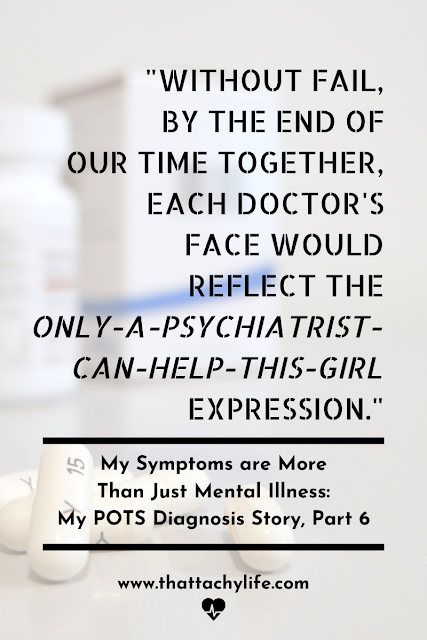
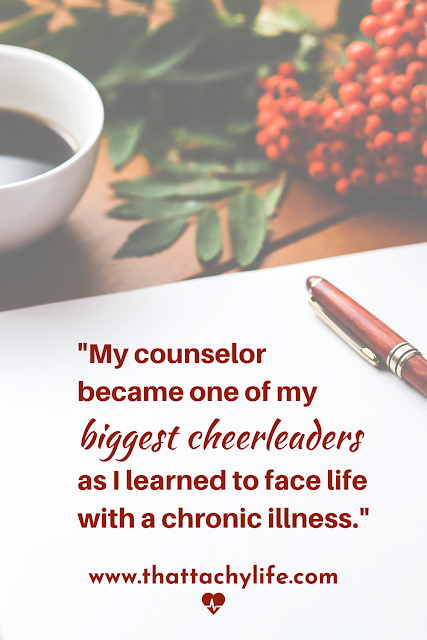
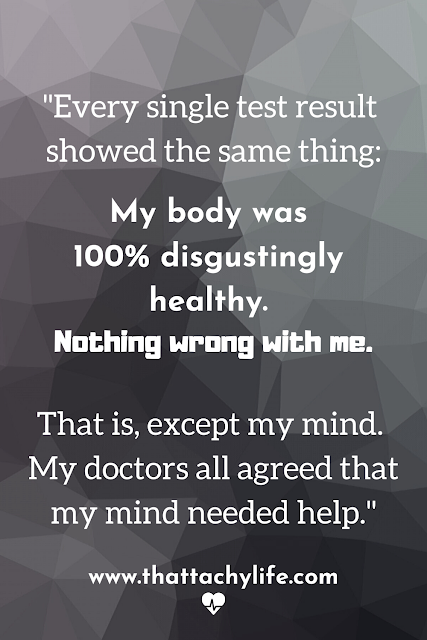
No comments:
Post a Comment